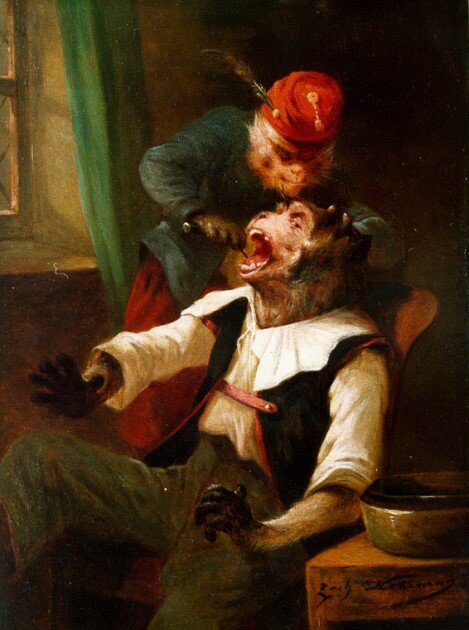A Brush With Greatness

Depending on the era that inspires them, a barbarian may be more likely to brush his teeth than an aristocrat.
Depending on the era that inspires them, a barbarian may be more likely to brush his teeth than an aristocrat.
Dental hygiene and tooth decay are some of the key issues of human health. While not as obviously important to survival as hand washing before surgery or some knowledge of anatomy when delivering babies, dental health has broad-reaching implications for health across the lifespan, and the evolution of dental health care has moved forwards (and sometimes backwards) along with all other aspects of medicine.
Tooth cleaning goes at least as far back as the ancient Babylonians. They used the miswak, a wooden tool that was likely sort of a cross between a toothbrush and a toothpick. The miswak was sufficiently important to Middle Eastern culture that the Islamic prophet Muhammad wrote that he had considered making its use mandatory three times per day for the health of men and the pleasure of god. Pre-Islamic healers claimed that regular use of a miswak would be good, not merely for oral health, but for good vision, clear thought, and a host of other functions with dubious certainty. Although often used alone, a miswak might be used with tooth-cleaning powders or scented water. Miswaks would slowly evolve into something resembling the modern toothbrush around the 1600s before finally catching on in the West towards the start of the 19th century. These brushes tended to use boar and pig bristles, which were the standard for hair brushes as well (for that matter, my favourite hairbrush still has board bristles… some things are just timeless), and these were replaced with nylon and other artificial bristles in the 20th century.
Toothpaste, for its part, is probably at least three thousand years younger than the toothbrush. In my reading, there seems to be some disagreement between historians as to whether toothpaste should be credited to India or China, but there was, after all, considerable cultural mixing. The earliest ones were probably abrasive powders made from crushed eggshells or other calcium-rich minerals, evolving to unpleasant-sounding soap- and chalk-based formulas when the always rational but rarely practical Victorians got a hold of the idea. Our modern conceptions of toothpaste, and especially the concept of minty freshness, date back only fifty or sixth years. In contrast, mouthwashes are probably about three thousand years old, younger than the miswak but much older than toothpaste; the Ancient Greeks practiced washing out the mouth with vinegar and salt, while medieval Europeans swished their mouths with wine and beer, probably accelerating their own tooth decay tremendously.
Loss of teeth has profound effects on creatures, particularly in societies where it’s not so easy to get processed or easy-to-eat foods. A creature in a hunter-gatherer society who loses its teeth is very limited, since it becomes unable to eat many meats, numerous fruits, most nuts, and the majority of roots, and without markets nearby, it may not get to choose what’s available in a given day or season. Poor diet means less energy to hunt or do work, less nutrients with which to build muscle or repair damaged tissues, slower thinking and poorer concentration, and a weaker immune system. In contrast, a creature living in more modern societies can get access to processed foods, fruit and vegetable preserves, minced or prepared meats, and otherwise obtain foods which can be more easily eaten without teeth. In addition, a creature living in a more modern society is probably more able to obtain replacement teeth and replacements of better quality. The consequences of tooth loss are more catastrophic to a creature in the more primitive setting, and this may partly explain why tooth care might actually be considered a higher priority where they come, rather than a lower. The desert nomad, whose life depends on having solid teeth, might actually be more motivated to brush and floss than the cleric who lives in a Renaissance-level urban center and who can survive without teeth, or for that matter, find someone able to magically repair them.
More than four years ago, Dr. Eris Lis, M.D., began writing a series of brilliant and informative posts on RPGs through the eyes of a medical professional, and this is the one that appeared here on June 5, 2016. Lis is a physician, gamer, and author of the Skirmisher Publishing LLC OGL sourcebook Insults & Injuries, which is also available for the Pathfinder RPG system.






